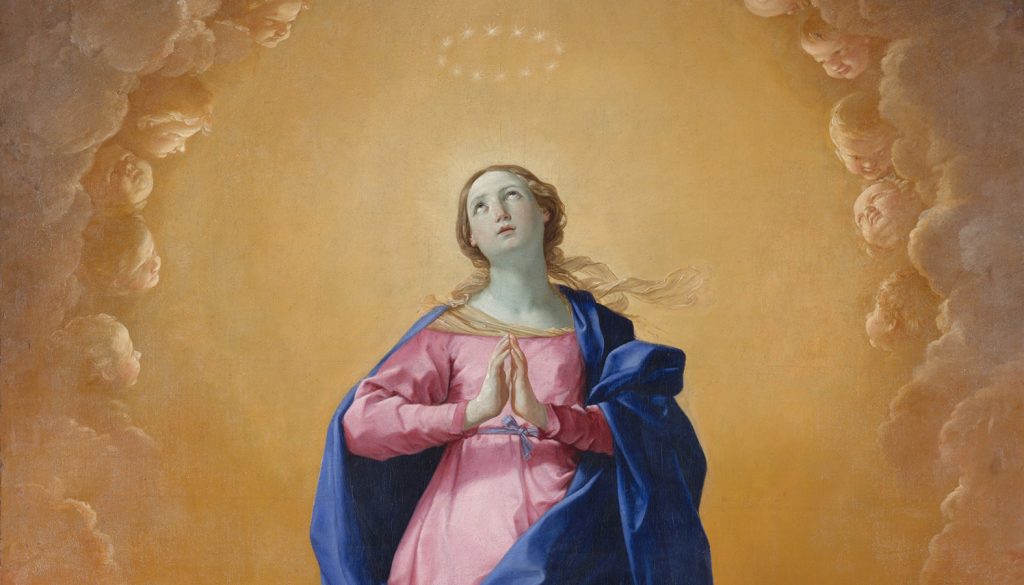There are three pressing reasons why we need the Immaculate Conception.
We can start with our misconceptions of God and of our life with him. The first reading for the solemnity sets us in Eden after the fall (Genesis 3:9–15, 20). There our first parents, in succumbing to temptation, abuse their freedom, prefer themselves to God, and permit their trust in the Creator to die in their hearts.
What provokes their disobedience? The serpent’s diabolical conception. The Catechism of the Catholic Church teaches that Adam and Eve “become afraid of the God of whom they have conceived a distorted image” (399). The devil seduces them into believing that they can be like God without God. The central element in Satanism, after all, is the absolute exaltation of self.
The Immaculate Conception confirms that the best way to be like God is by being in relationship with him as his children. That is why, to lead us back to paradise, God raises up an Immaculate Mother. When we are tempted by self-assertion and pride, we can look to Immaculate Mary to defuse our delusions, arrogance, and ego.
All of our faulty preconceptions, along with our “immaculate deceptions” regarding ourselves and God, get purified in the purity of Mary’s Immaculate Conception. For God’s conception of his own ineffable goodness, mercy, generosity, fidelity, and love is not an idea to be pondered but a person to be loved. Our Lady declares at Lourdes: “I am the Immaculate Conception.”
As St. Pope John Paul II taught, Mary the Immaculate Conception as mother raises us to the moral perfection proper to the children of God, making us worthy of God’s embrace by sharing with us her Immaculate holiness. Just as a mother imparts her DNA to her children, “no one is filled with the living thought of God except through Mary” (St. Louis de Montfort).
Second, perhaps now as never before in our experience, we live desperate for hope. Hope is certainty about the future founded on a fact in the present. The Immaculate Conception of the Blessed Virgin Mary in the womb of her mother, Anne, amounts to a revolution in human history. God’s ever-creative love pierces the pall of sinfulness by raising up a human being untouched by sin’s scourge. Thanks to this miracle, all things, says St. Anselm, “are in some sense restored to their lost beauty and are endowed with inexpressible new grace. All creation receives new life from Our Lady’s abundance.”
Keep in mind that God’s election of Mary is not due to her worthiness or anything she personally warrants or earns. God does not love us because we are good; God loves us because he is good. Mary the Immaculate Conception is God’s promulgation of that truth. And just as the Blessed Virgin Mary was not concerned about her acceptability before God, neither should we be. No matter how egregious our guilt, our despondency, our depression, all our alibis for staying away from God evaporate before the Immaculate Conception.
All that we do depends on how we conceive. A future of unending happiness would remain literally “inconceivable” without the hope provided in Mary the Immaculate Conception. It is our faith-filled union with the Immaculate Conception that reveals to us our eternal destiny, emboldening us to face the future with graced imagination. For the Immaculate Conception assures us that grace can make the impossible happen. “Mary’s unique vocation is inseparable from humanity’s vocation” (Pope John Paul II).
And finally, we need the Immaculate Conception in order to gain the courage to ask of heaven all that we require so as to become saints. For “our own morality is insufficient for the proper worship of God” (Pope Benedict XVI). But who has the right to ask for this?
Actually, we do not even have the right to know about the Immaculate Conception. Why was this intimate event not kept confidential between Our Lady and her Maker instead of becoming the defined dogma, holy day of obligation (here) that it is? Because not only do we need to be cognizant of this mystery — we need to appeal to it, to surrender ourselves to it.
Just as the attractiveness of the forbidden tree in Eden moved Eve to eat of its fruit, so the supernal beauty of the Immaculate Conception moves us to beg God for his forgiveness, friendship, and grace through Mary. Pope John Paul said that the purpose of Mary’s exalted holiness is “to encourage all Christians to open themselves to the sanctifying power of the grace of God, for whom nothing is impossible.”
Every grace God bestows upon the Blessed Virgin Mary he gives to her for us. Our Lady is eager to share with us the Lord’s lavishness to her. God confides through Blessed Julian of Norwich, “It is for love of you that I have made Mary so exalted, so noble, so honorable; and this delights me. And I wish it to delight you.”
God reveals to us the secret of the Immaculate Conception so that we will love him according to the method by which God manifests his love for us: in Mary the Immaculate Conception. Devotion to the Immaculate Conception offers us the chance to exercise the obedience that Eve spurned in Eden — and to regain paradise in the process.

